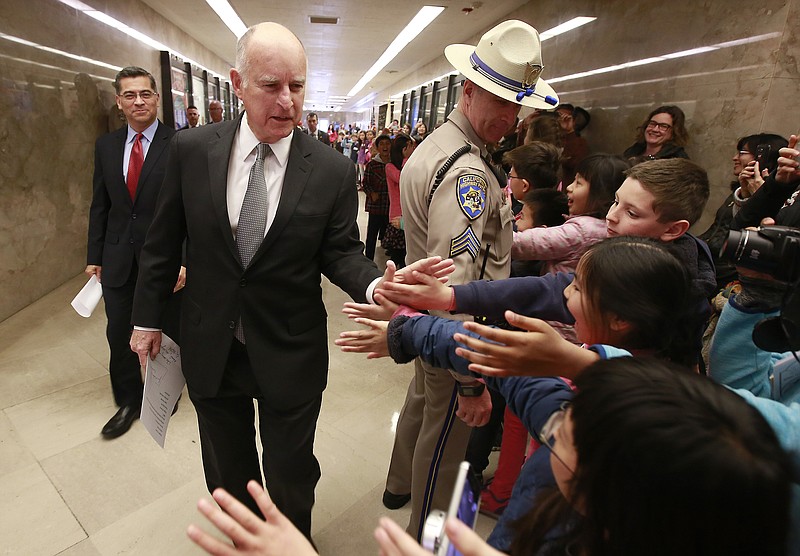SACRAMENTO, Calif. (AP) - U.S. Attorney General Jeff Sessions brought the Trump administration's feud with California to the doorstep of the state Capitol on Wednesday, suing over its sanctuary state law and dramatically escalating a war with the liberal powerhouse in an exchange of words with Democratic Gov. Jerry Brown.
Sessions spoke to local law enforcement officials about the lawsuit, citing a series of California laws he said are unconstitutional and violate common sense.
"I can't sit by idly while the lawful authority of federal officers are being blocked by legislative acts and politicians," he said, straying from his prepared remarks.
The lawsuit is the latest salvo in an escalating feud between the Trump administration and California, which has resisted the president on issues from marijuana policy to climate change and defiantly refuses to help federal agents detain and deport immigrants. U.S. Immigration and Customs Enforcement has said it will increase its presence in California, and Sessions wants to cut off funding to jurisdictions that won't cooperate.
The governor and state Attorney General Javier Becerra, who has sued the Trump administration numerous times, held a news conference just blocks from where Sessions spoke at a hotel, but they never interacted.
Sessions also used his speech to sharply criticize Oakland Mayor Libby Schaaf for warning the public about an unannounced raid by federal deportation officers recently in California. Sessions said it allowed hundreds of "wanted criminals" to avoid arrest.
Sessions received a polite if not warm reception from law enforcement officials, even when he told them his goal was to make their jobs safer. They applauded politely as he was introduced and after his speech, and more than a dozen gave a standing ovation at the end in a room of about 200 officials.
However, many sat expressionless, some listening with arms crossed or chins on their folded hands, and his 25-minute speech was never interrupted by applause or protest.
Outside, dozens of demonstrators chanted "stand up, fight back" and "no justice, no peace" and some blocked traffic on a major thoroughfare. There was a heavy police presence but no arrests.
"This is a reminder that California does not see his federal policies," said Steven Lynn, 33, a Sacramento graduate student. "We are a state of immigrants."
Trump is set to visit California next week for the first time since his election to see models of his proposed wall along the Mexican border.
California passed sanctuary laws in response to Trump's promises to sharply ramp up the deportation of people in the U.S. illegally. Sessions said several of them prevent U.S. Immigration and Customs Enforcement officers from making deportation arrests.
State officials said the policies increase public safety by promoting trust between immigrant communities and law enforcement, while allowing police resources to be used to fight other crimes.
One law prohibits employers from letting immigration agents enter work sites or view employee files without a subpoena or warrant, an effort to prevent workplace raids. Another stops local governments from contracting with for-profit companies and ICE to hold immigrants. Justice Department officials said that violates the Constitution's supremacy clause, which renders state laws invalid if they conflict with federal ones.

